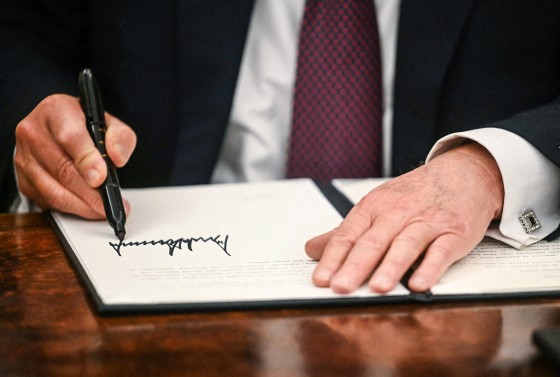
Boston According to a complaint filed by a transgender woman incarcerated in a federal prison, President Donald Trump’s executive order mandating that the U.S. government acknowledge only two unchangeable sexes and forcing prisoners like her to be kept in men’s prisons is against both federal law and the U.S. Constitution.
The inmate, who is being represented by attorneys from rights organizations such GLBTQ Legal Advocates & Defenders, filed a lawsuit in federal court in Boston on Sunday, criticizing an order that Trump signed on his first day back in office on January 20 that targeted what he described as gender ideology extremism.
The case seemed to be the first to be filed nationwide against the directive, which requires the federal government to stop supporting any gender-affirming medical care for prisoners, imprison transgender people in men’s prisons, and only recognize two biologically separate sexes, male and female.
According to the lawsuit, Trump’s executive order required prison personnel to treat inmates differently based on their sex, which violated the plaintiff’s due process rights under the Fifth Amendment of the U.S. Constitution.
The lawsuit claims that denying the plaintiff access to medically necessary healthcare would be against the Rehabilitation Act of 1973, a federal law, and that the plaintiff’s upcoming transfer to a men’s prison would also violate the Eighth Amendment’s ban on cruel and unusual punishment.
Reuters obtained access to the complaint on Sunday, but it was subsequently sealed for unknown reasons.
The inmate’s lawyer chose not to comment.
The federal Bureau of Prisons is governed by the U.S. Justice Department, which chose not to comment.
The complainant, who went by the alias Maria Moe, said that federal Bureau of Prisons officials told her she was being moved from a women’s prison to a men’s facility the day after the Republican president signed the order.
The lawsuit also claimed that the Bureau of Prisons was about to deny the inmate access to hormones she had been taking since she was a teenager to manage her gender dysphoria, and that it had changed the way it publicly recognized her from female to male. The clinical diagnostic for severe distress that can arise from a mismatch between a person’s gender identity and the sex they were assigned at birth is gender dysphoria.
The inmate’s attorneys contended that she would be at a very high danger of sexual assault, violence, abuse, and harassment if she were moved to a men’s facility.
The complaint wants a judge to rule that Trump’s executive order violates Moe’s constitutional rights and aims to preserve her current residence and medical care.
The crime for which the plaintiff was found guilty was not specified in the lawsuit.
